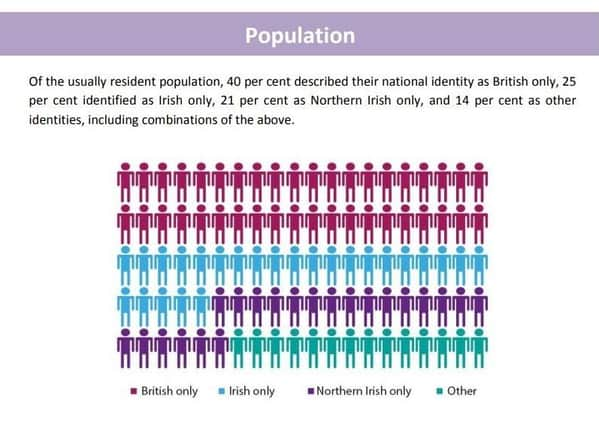Be loud, proud & unabashed about 100 years in the Union (despite Boris’ betrayal)


As the architect of an Irish Sea border that will divide the United Kingdom’s economy, his credentials are in question, but he is right that there is “something obviously to celebrate”.
From the moment that Northern Ireland was established in 1921 it existed in the face of hostility and vitriol. A separatist minority refused to participate in its institutions, while the ‘Free State’ with which it shared the island sponsored an IRA campaign aimed at making the new entity ungovernable.
Advertisement
Hide AdAdvertisement
Hide AdAgainst that background, there were elements of its development that were less than ideal. These six counties were simply the part of the island that refused to succumb to separatism and secede from the United Kingdom.
Their place was in a modern, successful nation state, whose values shaped western civilisation.
As an attempt to placate Irish nationalism, though, Northern Ireland was equipped with its own ‘home rule’ parliament. In time, that caused the province to become a ‘place apart’ from the UK political mainstream.
The founding father of Ulster unionism, Edward Carson, was deeply suspicious of devolution to Stormont, but his successors grew attached to its powers.
Advertisement
Hide AdAdvertisement
Hide AdAt times, confronted by animosity, they used them to assert dominance over the separatist minority. Nationalist mythology exaggerated the extent of discrimination, but David Trimble put it best when he said that Northern Ireland was allowed to become a ‘cold house’ for some of its residents.
Over the course of one hundred years, politically, culturally and socially, this part of the UK developed a distinctive identity. Yet, Northern Ireland’s uniqueness is grounded in its membership of the United Kingdom. Outside that context, there’s no purpose to its existence.
Quite understandably, many unionists feel let down by Boris Johnson, to say the least.
His capitulation to the idea that Northern Ireland’s links to the Republic should be prioritised over its place in the UK has been described as a betrayal.
Advertisement
Hide AdAdvertisement
Hide AdHowever, he is the prime minister of our country, so it is right that he should be involved closely in developing a programme of celebrations.
The debate about what shape that those celebrations should take is belated, but at least it is now happening. They should be sensitive and reflective, certainly, but they should be unabashed about promoting the merits of being part of the UK and looking forward to many more decades for Northern Ireland.
The commemoration can recognise that people have different perspectives on our history without pandering to hostility. If republicans, whose movement spent 30 years trying to destroy Northern Ireland through bombs and bullets, have nothing constructive to contribute to the centenary, for example, they should be ignored.
As Ben Lowry noted in these pages (NI centenary celebrations should be inclusive — up to a point, August 15), a growing number of residents claim ownership of a Northern Irish identity, and feel proud to come from this place. Looking back over the last one hundred years, there are many legitimate reasons for that pride.
Advertisement
Hide AdAdvertisement
Hide AdThere is the outsized contribution to culture, sport and society made by people from Northern Ireland. The economic heritage that marked Ulster out from the rest of Ireland and made it an engine of industry for the British Empire. NI’s contribution to the Second World War, including its stoicism during the Belfast Blitz.
Neither should we forget or whitewash the achievement of forging a new political entity against a backdrop of relentless attacks. And the Troubles, when the people of Northern Ireland showed resilience in the face of terrorist violence, are an important part of our story that cannot be left out.
When the prime minister spoke about the centenary, he emphasised its importance to the history of the whole country. It established the configuration of the United Kingdom that we know today. For unionists, that is arguably the most important aspect of the celebration, and it provides an opportunity to promote our place in the state and our contribution to its national life.
Yes, it’s ironic that Johnson’s pro-Union rhetoric contrasts starkly with his actions in negotiating the Northern Ireland protocol. The centenary, though, is not a suitable platform for recriminations. The celebrations must have a national dimension and we should use them to emphasise that we still have an important role to play in the United Kingdom, and that we value our place in the Union deeply.
Advertisement
Hide AdAdvertisement
Hide AdIt may not entirely be in the Northern Irish make-up, but let’s use the centenary, not only to celebrate loud and proud, but also to win friends and influence people, in the interests of getting the next one hundred years off to a successful start.
– Owen Polley is a unionist writer and commentator